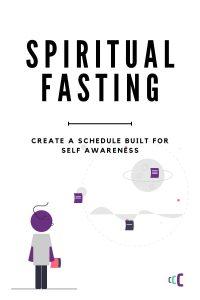A spiritual fasting schedule could very much be the vehicle that delivers definitive information about who you are made to be.
A habitual exercise of spiritual fasting most definitely leads to the creation of potential opportunities to receive from God.
This process also leaves an effect on the human structure that I have grown to love; A wary consciousness.
In this fasting post, I present my thought process behind planning and preparing for a spiritual fast with the goal of increased spiritual sensitivity.
If you’re looking for a spiritual fasting guide, a routine to swipe, and resources to help you get started the right way, then keep reading.

Spiritual fasting terminologies.
People new to the spiritual practice of fasting will often find some terminologies unfamiliar and confusing. I did too. This section explains the meaning and use of such terms.
Some fasting terminologies include;
- Open fast.
This fasting terminology is used to refer to the commencement of a fast session per day. So if you’re fasting from 6-12 pm, then you ought to open fast by 6 am every day throughout the fast duration. - Break fast
This action marks the end of the fasting session each day over the course of a fast duration. It’s one you’d look forward to at first. It is often accompanied by a prayer. - Fast duration
This refers to the entire session in days per any fasting exercise. Examples are 3 days, 7 days, 40 days, and so on. - Begin fast or start fast:
Contrary to open fast, begin fast is the act of marking the start of a fast duration. It is defining the date of the grand opening establishing a time boundary both in the physical and spiritual world. - End or close fast:
The action of ending a fast caps off the fasting campaign. The interplay of begin and end fast practices produces the fast duration. So if I want to fast for a duration of 21 days from the 7th day of every year, I will begin or start fasting on the 7th of January and End on the 28th.
Spiritual fasts: Fast this way.
Fast this way; While you fast biblically, be conscious of your inner world.
Breakthrough, healing, and repentance are some of the reasons we fast.
Those are good reasons to fast but that’s not all there is to fasting.
Improved spirituality
From the scriptures, we know that when we fast biblically, there is bound to be a response from God.
This expectation keeps us on our toes, thus, creating an awareness that could last beyond the period of fasting.
For instance, during and after dry fasts, I experience moments such as this: I am thirsty and about to take water, then I pull the brakes and become more sensitive to otherwise involuntary subconscious hijacks.
Fasting can facilitate self-awareness which is an ingredient for self control.
Also, it is not arbitrary that Jesus instructs us to go into our inner chamber and be discreet when we pray and fast. When you focus your energy inwardly, you allow yourself to attune to your spiritual essence.
A person’s spirit is the contact point of communication with God and God is expecting to meet with you as a spirit being.
Make this a focal point as you create your spiritual fasting schedule and plan to execute it.
Getting started with your spiritual fasting schedule
There are three considerable factors that determine the steps to take toward the creation of a spiritual fasting schedule. They are;
- Circumstances.
- Fasting rules.
- Timing.

1. Consider your circumstance
When you go in and out of seasons, there’s every tendency that the need to fast spiritually will arise.
Surely as the Holyspirit lives in you, welcome the propensity to fast at a given point in time.
So it’s important to consider the season you’re in and find ways to accommodate this spiritual practice.
Create a schedule around your available time.
There are usually ample hours during the holidays than during work periods or academic sessions. Let this be reflected in your schedule. If there are events that can be cleared out, remove them.
The point is to make room!!!
2. Establish fasting rules
I don’t know if it’s a thing but I personally like to lay down some rules governing each spiritual fast to ensure things go as planned.
Subject to the goal at hand, I construe laws that bind me to a devoted and regimented fast. It is something I prioritize when creating my spiritual fasting schedule.
So the secret is to fast from things that compete for my attention with God. This way, irrespective of time availability, I give God the best of me.
You should too. That’s what wholeheartedly means.
This also means that the list is personal. Search within you and listen to your guts’ instructions on what to abstain from (not just food and water).
For self-awareness, a fitting rule would be to take a break from social gatherings and social media. One time, I had to fast from video games and movies during each daily session.
3. Fasting Timing
Okay, well I’ve received the prompt to fast. I’ve decided to honor it. I’ve laid down rules to govern it. Archie, what’s next?
The next step in your spiritual fasting schedule creation is to create a timetable. This is the third factor to consider when creating a spiritual fast schedule. The fasting timing includes every event from open to break fast times and their allocated timestamps.
Determine Open times
Here’s how to determine when to open a fast
Open times are flexible depending on your average wake time but when set, it’s best to stick to it for health benefits.
To be honest, I’m not one to be up with the larks. Still working on it.
I get up quite late in the morning. Even later during holidays.
However, I try to place open times an hour before or after my average wake time. This achieves the desired effect of ascesis and wakefulness.
Determining daily sessions
Scientifically speaking, it takes an average of 3-4 hours for the body to finish the digestion process (depending on the food composition and individual biological differences). Afterward, the body automatically enters into early starvation mode.
What I like to do is to calculate the portion of the 24-hour period I am giving to fasting. This helps me nail down the perfect daily session with the backings of some good old numbers. So let’s do some maths.
A 24-hour period can be divided into halves, thirds, and quarters. Other fractions will hit below the starvation mark(4 hours).
- Halves; 2 halves containing 12 hours each.
- Thirds; 3 thirds containing 8 hours each
- Quarters; 4 quarters consisting of 6 hours per quarter.
Through this, I have an idea of how many hours I am fasting per day and the cumulative fast sessions in days.
Determining break times
After calculating what portion of the day I am giving to fasting, I add the value to the opening time, and Voila! my breaking time!
Let’s bring it all together.
Say, for instance, I want to fast during the Holidays starting from 8 am for 3 days. If, I decide to give one-third of each day to fast. I will break my fast 8 hours later by 4 pm.
Do keep in mind that fast durations ie 40 days, 3 days, etc are only tentative. The Holyspirit can lead you to extend or reduce (most likely the former). It’s only at the break time of end dates that you become certain.
Fasting Events
The activities executed during a fast and the motive behind them are the distinguishing factors of a spiritual fast.
Populate your schedule with activities that are spiritual in nature drawing you closer to God and improving selfhood. These activities should make you want to think of God, delight in God, and walk in godly ways causing human nature to be subservient.
Some of these events include but are not limited to;
- nature walks,
- Bible studies,
- long prayer,
- praise and worship,
- devotionals.
Spiritual fasting tips
Below are a few tips on sticking with the program plans for conducting a spiritual fast.
- Have a goal. Having a goal to meet helps you know when your fast has yielded results. Even if results come years later they can be traced. Be selfless too. Some daily goals could be generosity or intercession for family and friends.
- Don’t underestimate the difficulty of spiritual fasts just because you normally go hours without food. It becomes so different when it is done out of a spiritual motive.
- Set alarms and use systems. Leverage alarms and systems to make you consistent with the routine.
Click me to download a free 3-day planner to help you timebox your daily fast agenda.
Conclusions
Spiritual Fasting involves tuning into our inner world and harmonizing with our spirit man.
It’s a tough praxis and but the results far outweigh the costs.
I haven’t missed an annual fast since I was saved. Don’t think I would for any reason. But I must admit, sometimes I feel like putting it off. Mental conditioning is required in these cases. Perhaps that’s room to practice self discipline.
Do you have a fasting routine? If Yes, How does it fit into your schedule and what testimonies can you share from your experiences of spiritual fasting?












